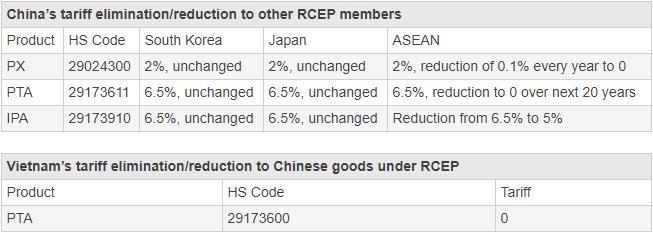Chinese tariff cuts on PX and PTA under RCEP
The Association of Southeast Asian Nations (ASEAN) Secretariat announced on Nov 2 that the Regional Comprehensive Economic Partnership (RCEP) agreement, the world's largest trade deal so far, would go into force on Jan 1, 2022. The Secretariat has received instruments of ratification from six ASEAN countries, namely Brunei, Cambodia, Laos, Singapore, Thailand, and Vietnam, as well as from the four non-ASEAN signatory states of Australia, China, Japan, and New Zealand.

Under RCEP agreement, China’s tariff to PX, PTA and IPA from Japan and South Korea is not changed, while there would be reduction in the tariff to ASEAN members. The tariff on PX from ASEAN members would be reduced to 0 over the next two decades. The members trading PX to China include Brunei, Thailand, Singapore and Vietnam, and ASEAN is expected to account for 18.2% of total Chinese PX imports in 2021.
Among the RCEP members, only Vietnam imports PTA from China and it is expected to take up 6.4% of total Chinese PTA exports in 2021. Under the RCEP agreement, the tariff on Chinese PTA is eliminated.

Under China-ASEAN FTA agreement, Chinese tariff to ASEAN PX has dropped to 0 in 2009 and that to PTA has reduced to 0 as well in 2012.
- Top keywords
- Cotton Price
- Cotton Futures Price
- Cotton Futures
- CZCE
- PTA Futures Price
- Chemical Fiber
- Polyester Prices
- Wool price
- PTA Futures
- Shengze Silk
- China
- Yarn Price
- price
- China Textile City
- Fibre Price
- Benzene Price
- Cotton
- Index
- Cotton Index
- PTA
- fabric price
- NYMEX
- Top 10
- textile industry
- Spot Cotton
- Cotton Yarn
- Polyester Price
- Futures
- PTA Price
- cotton yarn price

